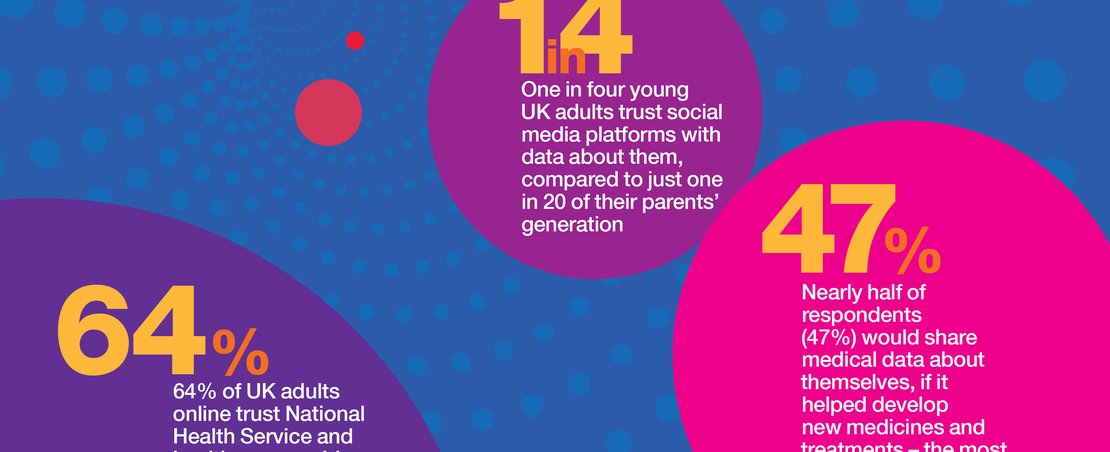
The Open Data Institute has released findings from new consumer research, conducted online by YouGov, revealing current attitudes of British adults online towards sharing personal data. The full dataset can be viewed here under an open licence
The findings show that:
Age matters: young adults were generally more comfortable sharing information about themselves, compared to their parents’ generation.
- One in five 18-24 year-olds said they would feel comfortable sharing their date of birth to an organisation they didn't know. For 45-54 year-olds, the figure was just 8%.
- 38% of 18-24 year-olds said they would be happy to share data about their spending habits to help save them money via things such as new savings accounts, insurance policies, shopping discounts, this fell to just 15% of over 55s.
- One in four young British adults trust social media platforms with their data, compared to just one in twenty of their parents’ generation.
Trusting and knowing organisations increase the likelihood consumers will share personal data about them
- 94% said trust was important in deciding whether to share personal data.
- 64% would share some personal data with an organisation they know, compared to just 36% for an organisation they don’t.
Healthcare organisations are most trusted
- The survey indicates that most consumers (64%) trust the NHS and healthcare organisations with personal data about them, ranking top ahead of friends and family (57%), banks (57%), local government (41%) and online retailers (22%).
- Just one in ten trust social media organisations such as Facebook and Twitter with personal data about them, as echoed in the report published recently by Dunnhumby and the ODI looking at opportunities in the retail grocery sector thanks to the forthcoming General Data Protection Regulation.
Data skills need to be improved
- One in three (34%) respondents say nothing would make them feel more comfortable about sharing personal data about themselves.
- Organisations need to explain to customers how personal data about them will be used and shared. One third (33%) of respondents said this would make them feel more comfortable sharing data.
- Just 9% said they already feel comfortable about sharing data about themselves. 33% said they would feel more comfortable if an organisation provided an explanation of how it intended to use or share the data; and 18% would welcome step by step instructions from an organisation about how to share data safely.
Consumers are prepared to make worthy trade-offs to share data about them if it benefits themselves and others in society
- Nearly half of respondents (47%) would share medical data about themselves, if it helped develop new medicines and treatments, the most popular ‘data trade off’ in the survey.
- 37% of people (and 49% of 18-24 year-olds) said they would share data about their background and health preferences if it helped advance academic understanding of areas such as medicine or psychology. While 28% were comfortable with personal data such as their online activity being used to monitor crime and keep them from harm.
- 38% of 18-24 year-olds said they would be happy to share data about their spending habits to help save them money via things such as new savings accounts, insurance policies, shopping discounts, this fell to just 15% of over 55s.
Dr Jeni Tennison, CEO at the Open Data Institute said:
‘When data is working hard for consumers, it should help them make better decisions, save money, and present them with wider benefits and opportunities. This survey shows that more people need to understand how to share data confidently to reap these rewards.
‘At the ODI we want consumers to feel more confident and informed about data. Data literacy is not a solution for all problems — we will always need strong regulation and well-designed, ethical services — but it is part of the answer to building and retaining trust in data. Improving data literacy is partly down to organisations designing services that are far more proactive and transparent in explaining how they use customer data [1]. This makes it easier for consumers to use their increased rights in the forthcoming EU data protection regulations, which put them more in control of personal data about them. Additionally, organisations need to be clear about what customers will get in return for sharing data.
‘It is also important that educators include data literacy in courses both in formal education environments, and informal environments for people not in full-time education.’
About the survey
All figures, unless otherwise stated, are from YouGov Plc. Total sample size was 2,023 adults. Fieldwork was undertaken between 28-29 November 2017. The survey was carried out online. The figures have been weighted and are representative of all GB adults (aged 18+).
Get in touch
If you'd like to talk to us about the poll, data skills or to see if there's any opportunity for us to collaborate, please do get in touch.